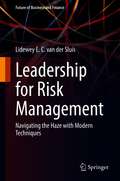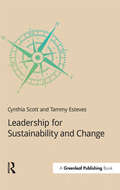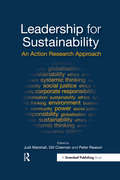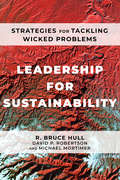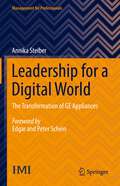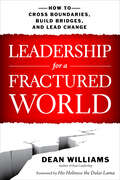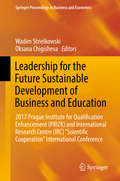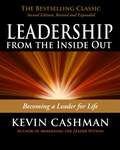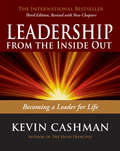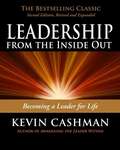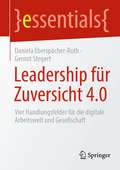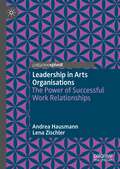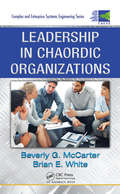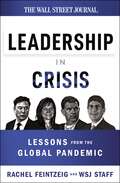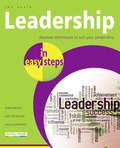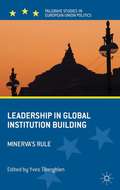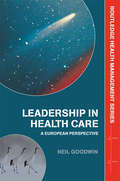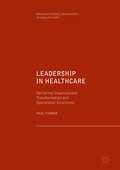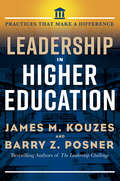- Table View
- List View
Leadership for Risk Management: Navigating the Haze with Modern Techniques (Future of Business and Finance)
by Lidewey E. van der SluisThe market is like the sea: it gives, and it takes away. That became apparent once again when the economy and society went into “lockdown” due to the coronavirus outbreak. Organizations will either sink or swim, and only the pros will be able to keep their heads above water.This is a self-help book for managers, supervisors and administrators who see themselves as skippers at the helm of an organization in times of turbulence, uncertainty and complexity. It provides a number of the latest handy management models, such as the Three-Phase Model, Governance Model and Management Matrix, which help leaders and managers arrive at well thought-out risk management decisions. In addition, the practical cases and discussion questions in each chapter help readers implement these models in their organizations. The book is an English translation of the Dutch book ‘Varen in de mist’, which was nominated for the Dutch Management Book of the Year.
Leadership for Social Justice in Higher Education
by Terance W. Bigalke Mary S. ZurbuchenThis book provides a wealth of comparative information on social justice in higher education worldwide by examining how the Ford Foundation International Fellowships Program, the world's largest private fellowship program in higher education, has succeeded in fostering social justice leadership over the past ten years.
Leadership for Sustainability and Change (Doshorts Ser.)
by Cynthia Scott Tammy EstevesWe live in challenging times. New leaders are enhancing their "inner game" to maximize their organizational impact, and using the principles of sustainability to help their organizations thrive and innovate in response to 21st century challenges. Leadership for Sustainability and Change is a concise, practical and energizing distillation of what is working for today's most successful sustainability leaders. It provides a clear set of actions you can take to generate transformation, with results yielding market advantage, eco-efficiency, product or service innovation, personal resilience and engaged communities. Learn from the experience of successful sustainability leaders how to: build personal resilience and agility to lead change for the long-run; sustain innovation that is released in bursts of focused "energy for good"; draw attention to what is working by focusing on the power of small differences; decrease resistance and increase motivation with a change acceleration model; identify stages of individual and organizational readiness for change; use rapid prototyping to increase group engagement; tell compelling stories to encourage teams to initiate action. Leadership for Sustainability and Change offers guidance for leaders who are shaping the future of sustainability within their organizations. The book includes a simple framework for assessing your progress, so that you can revisit the tools and processes you need most.
Leadership for Sustainability: An Action Research Approach
by Peter Reason Judi Marshall Gill ColemanThose who advocate moving towards sustainability debate how change can be achieved. This book focuses on what it means to take up leadership for sustainability, from a variety of organizational and social positions, and considers the consequences of different strategies and practices for influencing change.
Leadership for Sustainability: Strategies for Tackling Wicked Problems
by R. Bruce Hull David P. Robertson Michael MortimerSolving today's environmental and sustainability challenges requires more than expertise and technology. Effective solutions will require that we engage with other people, wrestle with difficult questions, and learn how to adapt and make confident decisions despite uncertainty. We need new approaches to leadership that empower professionals at all levels to tackle wicked problems and work towards sustainability. Leadership for Sustainability gives readers perspective and skills for promoting creative and collaborative solutions. Blending systems thinking approaches with leadership techniques, it offers dozens of strategies and specific practices, illustrated by inspiring case studies. Readers will come away with a holistic understanding of how to lead from where they are by applying leadership principles and practices to a wide range of wicked situations.
Leadership for a Changing World: A Call to Adaptive Work
by Sharon D. ParksToday's increasingly complex and challenging world demands more and better leaders than ever before. Yet conventional methods of leadership training and teaching often fail to effectively transfer critical leadership skills into practice. In this chapter, the author advocates and describes the case-in-point teaching model in answer to the question: can leadership be taught?
Leadership for a Digital World: The Transformation of GE Appliances (Management for Professionals)
by Annika SteiberThe pace of change today is unprecedented. As more than one observer has said, change itself has changed. Technologies and markets in virtually every industry are now subject to rapid and unpredictable change, placing a premium on the ability to successfully manage new paradoxes, such as being entrepreneurial and efficient, as well as able to sense shifts and rapidly respond and secure enough stability for quality and efficiency. In short, enterprise leaders face a paradigm shift in management, and they will be forced to transform their organizations in order to survive in the 21st century. This book will provide leaders with the fundamental principles for managing a firm in the digital economy, as well as the Rendanheyi business model, developed for the new century. Finally, the book will provide leaders with a case, based on GE Appliances, on how they can effectively transform their own organizations. Foreword by Edgar Schein and Peter Schein.
Leadership for a Fractured World: How to Cross Boundaries, Build Bridges, and Lead Change
by Dean WIlliamsLeaders today—whether in corporations or associations, nonprofits or nations—face massive, messy, multidimensional problems. No one person or group can possibly solve them—they require the broadest possible cooperation. But, says Harvard scholar Dean Williams, our leadership models are still essentially tribal: individuals with formal authority leading in the interest of their own group. In this deeply needed new book, he outlines an approach that enables leaders to transcend internal and external boundaries and help people to collaborate, even people over whom they technically have no power.Drawing on what he's learned from years of working in countries and organizations around the world, Williams shows leaders how to approach the delicate and creative work of boundary spanning, whether those boundaries are cultural, organizational, political, geographic, religious, or structural. Sometimes leaders themselves have to be the ones who cross the boundaries between groups. Other times, a leader's job is to build relational bridges between divided groups or even to completely break down the boundaries that block collaborative problem solving. By thinking about power and authority in a different way, leaders will become genuine change agents, able to heal wounds, resolve conflicts, and bring a fractured world together.
Leadership for the Future Sustainable Development of Business and Education: 2017 Prague Institute For Qualification Enhancement (prizk) And International Research Centre (irc) Scientific Cooperation International Conference (Springer Proceedings In Business And Economics)
by Wadim Strielkowski Oksana ChigishevaThis proceedings volume examines leadership from the perspectives of business, economics, social sciences, cross-cultural management, and education as a means to establish a future of sustainable development. Featuring contributions from the 2017 Prague Institute for Qualification Enhancement (PRIZK) and International Research Centre (IRC) “Scientific Cooperation” International Conference held in the Czech Republic, this volume focuses particularly on business models and higher education schemes from BRICS nations and examines topics such as social and educational practices, academic policies and business development. Leadership is becoming a key element for the future sustainable development of business and education in the quickly globalizing world. In this regard, a special emphasis should be made on the formation of high-quality human resources—the leading experts in their field who will create innovations and introduce breakthrough technologies. The development of a creative economy and knowledge economy requires highly-educated human capital, thus education becomes a key element of this process. Education must keep pace with time, be competitive, and stay in touch with the process of technology. The enclosed papers identify the key steps for sustainable growth and development in business and education. Featuring contributions on theory and practice, this book is appropriate for academics, researchers, policy-makers and practitioners in the areas of business, leadership management, entrepreneurship, innovation and education.
Leadership from the Inside Out: Becoming a Leader for Life
by Kevin CashmanLeadership from the Inside Out, Kevin Cashman's breakthrough business bestseller that clearly connected personal growth to leadership effectiveness, is now completely revised and updated with:-an explosion of new validating independent research -impressive new case studies -new tools and practices-an even more powerful virtual coaching experience Still framed in seven simple yet profound “mastery areas,” this book serves as an integrated coaching experience that helps leaders understand how to harness their authentic, value-creating influence and elevate their impact as individuals, in teams, and in organizations. Cashman demonstrates that his trademark “whole-person” approach—we lead by virtue of who we are—is essential to sustained success in today's talent-starved marketplace and provides a measurable return on investment. For everyone from CEOs to emerging leaders, this long-awaited second edition advances the art and science of leadership and is even more relevant today than when it was first published.
Leadership from the Inside Out: Becoming a Leader for Life
by Kevin CashmanThis classic bestseller by Kevin Cashman pioneered a holistic approach to leadership development: grow the whole person to grow the whole leader. The third edition turns leadership development inside out for a new generation of authentic, purpose-inspired leaders.This book was the first to reveal and build on a foundational insight: we lead by virtue of who we are. Cashman's trademark whole-person approach is essential to success in today's talent-starved marketplace and provides a measurable return on investment. Framed in seven simple yet profound personal mastery areas, this book serves as an integrated coaching experience that helps leaders understand how to harness their authentic, value-creating influence and elevate their impact as individuals, in teams, and in organizations. The third edition contains updated content in the first three chapters-Personal Mastery, Purpose Mastery, and Interpersonal Mastery (the most foundational chapters in the book)-and includes a new chapter, Story Mastery: Leading with Inspiration. This chapter deepens comprehension of authenticity, provides a more significant sense of meaning and purpose, and inspires more profound interpersonal connection. For everyone from CEOs to emerging leaders, this long-awaited third edition advances the art and science of leadership, which makes the book even more relevant today than when it was first published.
Leadership from the Inside Out: Becoming a Leader for Life (2nd edition)
by Kevin CashmanCashman (leadership development, executive coaching, and team effectiveness consulting) offers an updated and revised second edition to his classic book on leadership. The book still contains the author's core seven "mastery areas," but includes a number of new features: new independent research, new case studies, new tools and practices, and a more potent virtual coaching experience. The book will interest anyone from CEOs to aspiring leaders. Annotation ©2009 Book News, Inc., Portland, OR (booknews.com)
Leadership für Zuversicht 4.0: Vier Handlungsfelder für die digitale Arbeitswelt und Gesellschaft (essentials)
by Daniela Eberspächer-Roth Gernot StegertDigitale Transformation ist eine der größten Herausforderungen für Organisationen, Unternehmen und demokratische Gesellschaften. Das Autorenduo greift die Gefahren konstruktiv auf, betont die Chancen und entwickelt von einem positiven Menschenbild aus evolutionär Empfehlungen für Zuversicht in einer digitalen Welt. Praktische Leadership-Elemente in vier aufeinander aufbauenden Handlungsfeldern verhelfen darüber hinaus zu einem positiven Umgang mit digitaler Technik.
Leadership im Marketing: Sechs strategische Leitprinzipien als Erfolgstreiber für eine führende Markt- und Wettbewerbsposition (essentials)
by Marco A. GardiniMarketing wird zunehmend weniger als Führungsphilosophie verstanden. Um die Erfolgs- und Praxisrelevanz einer strategischen und integrativen Kunden- und Marktorientierung im Innen- und Außenverhältnis eines Unternehmens offen zu legen, werden in diesem essential sechs strategische Leitprinzipien als Bausteine eines Leadership-Ansatzes im Marketing herausgearbeitet und vorgestellt. Diese Leitprinzipien werden als Erfolgstreiber auf dem Weg zu einer führenden Markt- und Wettbewerbsposition als unabdingbar erachtet.
Leadership in Arts Organisations: The Power of Successful Work Relationships
by Andrea Hausmann Lena ZischlerAt a time of transformation for many arts and cultural organisations, this book provides a compact, in-depth and practical introduction to effective leadership in arts organisations. It begins with an overview of leadership theories, then moves on discuss the specific tasks and challenges of leadership in the arts, including digital leadership and remote work challenges for arts managers. Well-balanced and concise, this book combines a sound theoretical background in management with practical knowledge from the field. The underlying view is that all employees in arts and cultural institutions are responsible for successful leadership. Bearing this in mind the overall aim of this book is to provoke interest in better leadership in the arts and to generate knowledge of leading more effectively. It will be of interest to academics in the field of cultural management, creative industries management, heritage management and leadership in the arts. Additionally, it will be of interest to professionals working in these fields and explores topics that affect every leader in the arts sector, including typical framework conditions, the most important leadership tasks and responsibilities and individual leadership styles and principles.
Leadership in Chaordic Organizations
by Brian E. White Beverly G. McCarterSupplying a clear vision of how to build high-performance teams, Leadership in Chaordic Organizations presents methods for improving operations through the application of complex systems engineering principles and psychological counseling techniques. Ideal for systems engineers, organizational managers, coaches, and psychologists, it addresses the
Leadership in Corporate Reporting Policy at Tata Steel
by Karthik Ramanna Rachna TahilyaniThe case describes the challenges faced by Tata Steel, India's largest private-sector steel company, as it transitions from Indian GAAP to IFRS. It first describes those challenges in the context of the institutional voids that make IFRS adoption difficult in India. The case then focuses on how companies in emerging markets might represent their interests at the IASB, the standard-setting body for IFRS.
Leadership in Crisis: Ernest Shackleton and the Epic Voyage of the Endurance
by Nancy F. Koehn Erica Helms Phillip MeadProvides an opportunity to examine leadership and entrepreneurship in the context of Ernest Shackleton's 1914 Antarctic expedition, a compelling story of crisis, survival, and triumph. Summarizes Shackleton's career as an officer in the British Merchant Marine, his work on several prominent Antarctic missions, and the competitive nature of polar exploration in the late 19th and early 20th centuries. Also examines Shackleton's planning and advance management of what he hoped would be the first-ever trek across the Antarctic continent. Details the events of this epic voyage aboard the Endurance. Readers have the opportunity to examine how, after the vessel became trapped in ice and the crew abandoned ship, the commander shifted his objectives and responsibilities from completing an historic march to ensuring the survival of all 28 expedition members. Considers Shackleton's efforts to maintain his team's morale, loyalty, and commitment in the face of extraordinary mental and physical trials during almost two years in the Antarctic.
Leadership in Crisis: Lessons from the Global Pandemic
by Thomas NelsonThe Covid crisis has been a proving ground of sorts for business leaders, forcing them to adapt to new realities and unprecedented uncertainty. Leading through it has often been painful, but it&’s also produced valuable lessons about rallying employees, navigating global pressures, and finding opportunity amid hardship.Leadership in Crisis profiles leaders of a range of business from auto giants like Telsa and General Motors to Moderna, the upstart that developed a Covid-19 vaccine, to a small grocery store in North Carolina. Takeaways include:Take advantage of a crisis to try something new.Channel your scrappiness and tenacity.Be of service.Turn to Leadership in Crisis and remember that when the world breaks, there are all kinds of opportunities to make it better, for your business and beyond.
Leadership in Easy Steps
by Jon PooleUnderstanding and working slavishly to set leadership models can mean missing some of the fundamental elements that will make you an effective leader - being true to yourself and others whilst at the same time maximizing your own strengths and personality characteristics.This book is designed to help you discover more about you, your own personal strengths and your potential and so become a genuinely inspirational leader of people based on your own personality rather than on someone else's. As well as describing some of the fundamental elements of leadership it also provides a number of simple exercises and assessment techniques that will help you determine your own unique style of leadership.Areas covered include: Role of a Leader Leadership Behaviors Adapting Your Style to Situations Empowering People Generating Ideas Developing Talent Turning Visions Into Reality Decision Making and Managing Risk Maximising PerformanceAn indispensible guide for anyone invloved in leading. Can you afford to be without it?
Leadership in Energy: Jim Rogers at Cinergy
by Nitin Nohria Boris Groysberg Colleen Kaftan Geoff MariettaJim Rogers, CEO of the energy company Cinergy, has led the company from the brink of bankruptcy to one of the premier energy companies through selecting a focused strategy, aligning the organization to support it, and mobilizing all the employees to implementation. The case also discusses the strategies used by Rogers to communicate the strategy, which included innovative image maps.
Leadership in Global Institution Building
by Yves TiberghienBetween 1995 and the present day, the world has undergone significant advances in international law, norms, and institutions. Progress was particularly intense in the fields of global environment, human security, cultural diversity, and human rights. This book reveals the key role played by the European Union, Japan, and Canada in this process.
Leadership in Health Care: A European Perspective (Health Management)
by Neil GoodwinThis unique text is the first to explore leadership in the context of healthcare systems across Europe. It investigates leadership and management learning against the backdrop of increasing European parliamentary influence, the expansion of EU membership, and the increasing number of patients, staff, governments and healthcare employers viewing Europe as a single market for healthcare provision and employment. Written by leading authority Neil Goodwin, this timely book provides an assessment of the literature as well as practical guidance for developing personal leadership. It includes case studies and examples and is a must-buy for all students studying health management, leadership and public management as well as professionals within health services across Europe. This is the fourth text in the Routledge Health Management Series.
Leadership in Healthcare: Delivering Organisational Transformation and Operational Excellence (Organizational Behaviour in Healthcare)
by Paul TurnerThis innovative book analyses the evolving nature of leadership, exploring an ever-increasing range of theoretical concepts and applying these to practices within healthcare organisations. A wide range of theories are covered, from behavioural to attitudinal, socio-cognitive to contingency, and social exchange to team. By identifying the common underlying characteristics that are present in leadership styles and approaches, the author successfully crafts a useful model that is adaptable to different scenarios and contexts within the realms of healthcare management. Offering a series of detailed case studies from around the world, this book proposes three crucial concepts for leadership within the health sector: leadership credibility, professional credibility and organisational dynamics. Both scholars and practitioners will find the theoretical framework provided in this book insightful and applicable in real-life situations.
Leadership in Higher Education: Practices That Make A Difference
by Barry Posner Jim KouzesThe authors of the classic bestseller The Leadership Challenge bring their expertise to higher education, offering five practices that can make any college or university leader into an exemplary leader. Drawing on the same pioneering research that formed the foundation of their classic bestseller The Leadership Challenge (over 2.7 million copies sold), James Kouzes and Barry Posner offer a set of leadership skills and practices that will make a significant difference in every area of higher education—faculty, administration, library services, career counseling, auxiliary services, campus safety, and more. It's about the behaviors that leaders, regardless of their position, use to transform values into actions, visions into realities, obstacles into innovations, segments into solidarity, and risks into rewards. Kouzes and Posner tell the leadership story from the inside and move outward, describing it first as a personal journey and then as mobilizing others to want to do things they have never done before. The Five Practices of Exemplary Leadership is the operating system for this adventure. Leadership in Higher Education explains the fundamental principles that support these practices and provides case examples of people in higher education who demonstrate each one. A core theme that weaves its way through all the chapters is that, whether it's one to one or one to many, leadership is a relationship between those who aspire to lead and those who choose to follow. We need leaders who can unite us and ignite us. This book lights the way.
